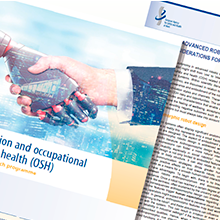Worker management through AI
Successful managers seek to ensure productivity, motivate employees and create a positive atmosphere. ( ) and -based systems can help managers by automating management tasks in the workplace. This can optimise work organisation for both employers and workers. For example, algorithms can predict customers’ future demand so that shifts can be scheduled to meet staff requirements and avoid the negative effects of being short-staffed. can also be used to assign tasks to workers based on their capabilities and skills.
However, there are a number of psychosocial risks to consider. The most common complaint is that workers feel reduced autonomy because their decision-making capacity is limited. They feel they are no longer in control of their work. Additionally, they feel pressured to work faster, causing work-related stress, health issues and accidents.
To ensure that -based worker management systems have a positive impact, it is important to work alongside workers to build . This starts by consulting workers and allowing them to participate in the design and implementation of systems. Transparency is key.
Learn how to make the most of -based worker management systems from our campaign resources.
Recommended resources
Publications
- Artificial intelligence for worker management: implications for occupational safety and health
- Digital technologies for worker management: implications for safety and health. A comparative study of two automotive companies
- Worker participation and representation: the impact on risk prevention of AI worker management systems
- How digital technology is reshaping the art of management
- Worker management through AI - From technology development to the impacts on workers and their safety and health
Case studies
Policy briefs
- Artificial intelligence for worker management: risks and opportunities
- Artificial intelligence for worker management: prevention measures
- Artificial intelligence for worker management: mapping definitions, uses and implications
- Artificial Intelligence for worker management: existing and future regulations
- Impact of artificial intelligence on occupational safety and health



